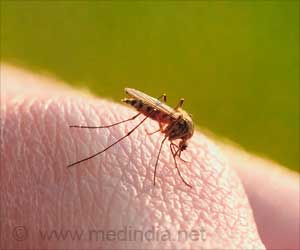Genetic modification is being pressed into service to fight tropical diseases that have remained intractable.
Oxitec, a British biotech company claims genetically modified mosquitoes, which are programmed for sudden, early death, can control the spread of dengue fever.It says it can decimate mosquito populations by breeding genetically modified male mosquitoes, then releasing them to mate with wild females. Their offspring contain lethal genes that kill them young, before they can reproduce. Company officials told Wired News that their latest test results show that the genetically modified bugs could breed just as well as wild ones.
"We will be able to control dengue through controlling the mosquitoes that transmit it, especially in large urban areas," said the company's chief scientist Luke Alphey. "Thereby protecting many, many millions of people from this disease."
If the scientists can replicate their results in real field conditions, their technology could kill half of the next generation of dengue mosquitoes, which, scientists say, would significantly reduce the spread of the disease. If all goes well, the company envisions releasing the insects in Malaysia on a large scale in three years.
But environmentalists are not convinced of the safety of the technology. "Releasing millions of genetically modified terminator mosquitoes into wild ecosystems amounts to a reckless and uncontrolled experiment with a risky technology," said Jim Thomas, of the ETC Group, a technology watchdog. "Oxitec's (project) abandons all pretense of containment or possible recall. I wonder what sort of liability they are willing to assume if something goes wrong?"
But proponents note that mosquitoes pass dengue fever to up to 100 million people each year. Up to 5 million die. Attempts to control mosquito breeding have not been greatly successful. In such situation, controlling through genetic modification could be welcome, they say.
Advertisement
The company's work has attracted the interest of some of the world's economic honchos. At the Davos Economic Forum this week, Alphey will receive one of 39 Technology Pioneer Awards. The Gates Foundation's Global Challenges in Global Health initiative is giving Oxitec $5 million over the next five years. The company has also received several million dollars in venture capital from East Hill Management Company and Oxford Capital Partners.
Advertisement
But the amount of radiation used in that technique kills mosquitoes. So in a twist on the sterile insect technique, Alphey discovered a way to genetically program the bugs to die unless they're fed the common antibiotic tetracycline.
By postponing death with tetracycline, the scientists can keep the altered bugs alive long enough to breed them in large numbers. When released into the wild, they no longer receive tetracycline so the previously silenced gene springs into action. The bugs stay alive long enough to breed with wild females, but their offspring die young.
In other words, the mosquitoes are genetically poisoned, but Alphey's team provides the antidote until they are released in the wild.
"It occurred to me that this could be used to give death, sterility or whatever you want in insects," Alphey said.
Alphey's approach to genetic modification is different from other research on so-called population replacement efforts, which aim to "inoculate" the mosquito population against dengue, which would, in turn, prevent them from passing it to humans, writes Alexis Madrigal.
Oxitec's technique is considered less controversial by some scientists because the genetically modified insects are programmed to die, not take over the existing mosquito population.
Like the ETC mentioned above, other groups too are up in arms. "Genetically engineered insects for pest control are a literal disaster waiting to happen," said Ronnie Cummins, director of the Organic Consumers Association, in an e-mail.
Alphey, however, believes the benefits -- potentially combating dengue as well as cutting down on pesticide use -- will stave off public protests.
"Clearly, there will be people who are completely closed to the idea, no matter what the benefit," Alphey said. "But … people know about malaria and dengue and these sorts of things. They know they don't want them. They really see the point in what people (like us) are trying to do."
Thomas Miller, an entomologist at the University of California at Riverside who has worked with Alphey on a cotton-crop pest, said the current mosquito population control options were not good.
They generally involve using insecticides or destroying their standing-water larval hatching grounds. In urban areas where dengue fever mosquitoes grow, however, it has proven difficult to eliminate small sources of water in empty coke cans, spare tires and gutters. On the other hand, low-tech options like bed nets have helped reduce rates of mosquito-borne infection, without reducing mosquito populations.
Oxitec is also working on genetically modified versions of fruit flies, pink bollworms and coding moths.
Source-Medindia
GPL/K









